- Home
- Chris Grabenstein
Mad Mouse js-2 Page 2
Mad Mouse js-2 Read online
Page 2
“Danny?”
It's Ceepak. He climbs off his eighteen-speed trail bike.
“I heard the call come in. Heard Becca's name.”
“Hi, Ceepak.” Becca sounds woozier.
Ceepak has a police scanner in his apartment. It's his favorite form of entertainment when he's not watching Forensic Files or listening to Bruce Springsteen CDs.
“Is she badly injured?” he asks.
“Eye trauma,” Olivia says. “Possible hyphema.”
Ceepak nods. “You noted a reservoir of blood in the anterior chamber?”
Olivia nods back.
“She needs to see an ophthalmologist. Stat.”
Ceepak turns to the paramedics who have just secured Becca inside the back of their boxy ambulance.
“Guys? Light ‘em up.”
“Will do, Ceepak,” says the muscle man. I think everybody in town who wears any kind of uniform or badge has heard about Ceepak. Knows he's a standup guy.
Ceepak gives them one of his famous two-finger salutes. “Appreciate it.”
The paramedics hop in, spin their flashers, and race away.
I dig into my shorts for the van keys.
“We should follow.”
A cop car crawls down Tangerine Street. No lights. No siren. Just the soft crunch of seashells under tires.
“Danny,” says Olivia, “maybe you should stay here. Tell the police what happened.”
“Yeah.” I turn to Jess. “You good to drive?”
“Yeah.” Jess never gets plotzed. Besides, the paintball incident was pretty sobering. I toss him the keys. They all hop into my van and take off after the ambulance. Ceepak and I will hang here because we speak Cop.
Well, Ceepak speaks it better than me, but I want to make sure we nail whoever the hell did this to my friends.
CHAPTER THREE
Probably juveniles,” Chief Baines says after taking a quick survey of the crime scene.
Everybody has a flashlight swinging around except me. The beach looks like it's hosting some kind of sand crab movie premiere.
“Punks with paintball pistols,” Sergeant Dominic Santucci shares his opinion.
“More likely a rifle,” says Ceepak.
“Because of the range?” asks Baines.
“Roger that. We can assume the shooter or shooters were positioned up there.” He points to the road. “They knew no one would hear them approach.” He points to the paint-spattered boom box lying dead in the sand. “The music was turned up to full volume.” Now he indicates the footprints circling the charred remnants of our campfire. “Danny and his friends were oblivious to any intrusion because they were busy dancing.” I haven't told Ceepak what we were doing. He can see it all in the sand.
Baines smiles. “Good work. I like the way you read a crime scene, John.”
I still can't believe the new chief is the one who caught this call. Apparently, he was riding along with Santucci on a routine night patrol as part of his “orientation process” when the ambulance call went out.
“Who do we like for this?” Baines asks Santucci.
“Well, there are these punks who hang out on the boardwalk. You know: tattoos, skateboards. Weird haircuts.”
Santucci isn't much of a profiler. He's just described half the guys who cruise up and down the boardwalk all summer long.
“There's a paintball place on the boardwalk,” I offer. “They might have a few names for us.”
“Mmm-hmm.” Baines thinks a minute. “The girl injured badly?”
“Blunt-force impact,” Ceepak says. “Possible hyphema.”
The new chief nods and thinks some more.
“Okay. Here's how we need to play this thing. Quiet. Almost like it didn't happen.” Baines flashes his Ultrabrite smile my way when he sees my jaw drop. “Take it easy, son. We'll catch the bad guys. But summer's officially over in five days. We don't want or need any more headlines, not this year. So, we all do our jobs, but-we keep it quiet.”
Baines is probably right. No need to stir up another panic. In the few weeks he's been in town, he's done a pretty incredible job of restoring faith in the local forces of law and order. Most folks, especially the visitors, have already forgotten what happened here back in July. I think that's why the town fathers hired Baines: He looks and sounds like he should be on TV telling you the truth, the handsome hunk sitting in the anchor chair. It's also why, from what I've heard, they're paying him a small fortune.
“Sergeant Santucci's theory is most likely correct,” Baines continues. “I suspect we're dealing with some bored kids who think they're being funny.”
Santucci points at my Hawaiian shirt. It looks like the flowers have exploded with neon-colored pollen.
“You got to admit, it is kind of funny.” He snaps his gum, does his donkey laugh. “Especially on Boyle there.”
Santucci has been busting my chops all summer long. If I go full time with the force, he can torment me daily, seven-to-seven, the whole twelve-hour shift. Longer if I pull any overtime.
“Chief?” says Ceepak. “We could look into this tomorrow. Both Auxiliary Officer Boyle and I have the day off. Might prove a valuable field training exercise. Help our minds stay active, help us keep our investigative techniques sharp.”
Baines nods. “But you'll keep it on the q.t.?”
“Right.”
Baines puts his hands on his hips and sniffs in some salty air.
“You sure you guys don't mind? Working on your day off?”
“I look forward to it, sir,” says Ceepak. “I welcome the challenge.”
I nod. “Me, too, sir.”
“Fantastic. Here's how we play it: Ceepak and Boyle investigate. Meanwhile, we alert all units to be on the lookout. We see a bunch of kids crammed in a car looking like they're looking for trouble, we pull them over.”
“That'll work,” Ceepak says. “Provided, of course, we have probable cause.”
“Oh, we always have probable cause,” Santucci sneers, like he thinks the whole Bill of Rights is a lousy idea dreamed up by a bunch of dead guys with their faces on coins.
“I look forward to hearing what you two dig up,” Baines says to Ceepak. “Might help me decide which summer cop to hire next week.” Now the chief gives me this meaningful glance.
Great.
The Case of the Perilous Paintballs is going to be my final exam, the homework assignment I need to ace to win full-time employment with the Sea Haven Police Department.
If we don't crack this case by Labor Day, I may have to find a job pushing carts around the parking lot at Wal-Mart.
CHAPTER FOUR
Everyone's gone, and I'm dancing on the beach again.
Well, not quite everyone. Ceepak's still here.
I'm doing a solo number without any music to show him my approximate location during the paintball bombardment. The campfire's long gone and he's shining his Maglite on me.
“I was here …”
“Facing the street.”
“Right. Katie was facing me. She took a hit in her … you know.”
I don't want to say “ass” or “butt.”
“Her gluteus maximus.” Ceepak helps out. He looks up toward the beachfront homes on the far side of the dunes. “The shots were probably fired from the street. Or off one of those balconies.”
I look to the left and right of our entrance to the beach. There are three or four houses on either side. Modern jobs. All windows and right angles. They look like vinyl-sided shoe boxes stacked on top of each other, and, since this is beachfront property, every level has its own balcony or sun deck. Some of the houses even have widow's walks-a platform up on top of the roof. I think they call it that because that's where the widows of ship captains used to hang out and hope their husbands weren't really dead. Probably cursed god and the ocean some while they were up there, too. The higher elevation made it easier to scream at heaven.
“Danny? Focus.”
“Right.”
W
hen I drift off like that, Ceepak usually reels me back in.
“Where was your radio located?”
“There.” I point to the trash barrel. “Propped on top.”
He takes one more look at the boom box lying in the sand on the ocean side of the trash barrel.
“Confirming that the shots came from the west.”
“From one of those balconies?” Ceepak crouches.
“I don't believe so. You say the paintball smacked you square in the chest.”
“Like somebody heaved a medicine ball at me.”
“I'd like to do a more comprehensive trajectory analysis, but judging from your impressions of the incident and the position of the radio, I'd say the shooter operated at street level. Perhaps firing from a car window.”
Ceepak stands. His face, as usual, doesn't say much, but I think he's relieved we're not dealing with some kind of rifleman up on a rooftop. He saw enough of those back in what the soldiers all call Bagh-nasty-dad. Snipers, mostly. Ceepak went in with the first wave, the guys hunting for the weapons of mass destruction nobody ever found because they never actually existed. Later, he was in this convoy that was almost blown up by one of those roadside bombs the locals like to hide inside everything from rusty oil drums to tricycle tubing. When the bomb blew, Ceepak's Humvee gunner went ballistic. Did some horrible stuff to several civilians. I think that's when Ceepak decided to rotate stateside when his tour and bounce-backs ended. Decided he'd pack up his medals and say so long to the army, which, up to that point, had been his whole life.
I hear him suck in some night air.
The way Ceepak squints up at those balconies and widow's walks? I know he's seeing bad guys with rocket-propelled grenades and AK-47s. He lost a lot of buddies back in the “sandbox.” Every now and then, he talks about it.
Every now and then.
“Come on,” he says. We start working our way up the sand. “The midnight gang's assembled and picked a rendezvous for the night.”
Now he's mumbling Springsteen lyrics. It's one of Ceepak's auto-focusing techniques. He remembers every song the Boss ever wrote-even ones Bruce has probably forgotten.
“They'll meet ‘neath that giant Exxon sign that brings this fair city light.”
This one's a classic. “Jungleland.” But I don't see any Exxon sign. The only light is off in the distance, about a half block up Tangerine. One of those orange-ish street lamps, its hazy beacon a dance club for the big flappy bugs that only come out at night.
We reach the dunes and seagrass. Ceepak crouches in front of a bench made from pressure-treated two-by-eights. It faces the ocean right where the beach ends and the rolled-out dune fencing starts. Nothing special. Just a place to sit and shake sand out of your shoes.
“See something?” I ask.
“Yes.”
“What?”
“Too many footprints.”
Ceepak stands up and dusts some sand off his pants.
People stop here to put on their sneakers or flip-flops or whatever before walking down to the street. You walk barefooted on hot asphalt in August, your feet are going to talk to you about it. Ceepak realizes it's such a high-traffic zone there's no way we're going to pick up any usable footprints or clues.
“We need to talk to some people.” He nods at the dark houses. “Find out if anybody saw or heard anything besides your music.”
“Right.” We had the radio blaring pretty loud, especially during the dance number. Mook was sending up his own personal noise pollution long before that. I'm sure some of the neighbors would give me an earful if they knew it was my Toasted Marshmallow Day party that disturbed their peace.
We crest the dune and walk down the short stretch of planks to the street. Ceepak hunkers down again. I do the same thing. Sometimes, it's like we play Simon Says.
He pulls a magnifying glass out of one of the pockets in his cargo pants. All I have in my shorts is a beer-bottle opener.
“Same story here.”
“Tire tracks?”
“Dozens,” he says.
He points to the sweeping arcs of tread marks and I see what he sees: Car after car drove down the dead-end street, dropped off the kids, unloaded all the beach stuff-much of which also had wheels: little red wagons, rolling ice chests, beach carts. We've got tire tracks on top of tire tracks.
“Nothing.” Ceepak bites his lip, shakes his head. TMI. Too Much Information. Nothing stands out. It all blends in.
“I don't believe paintball weapons expel shell casings.” Ceepak pulls out a notepad and jots something down. “I believe they act more like a cannon, propelling the ball out of the chamber. The ball stays intact until it strikes its target.”
“Yeah.” As one of the targets, I know how it strikes. I also know how it hurts.
“I need to do some research. But first, we need to knock on a few doors.”
It's almost one A.M. I'm sure the neighbors are going to love us.
“What about the q.t.?” I ask.
“Come again?”
“You know. The chief told us to keep this thing quiet. If we start asking questions, people will wonder what happened.” I point to my yellow-green chest.
Ceepak nods. Slow. Up and down, up and down. He's thinking.
“You make a valid point, Danny.”
“We'd have to tell them something.”
“Yes. But, I am disinclined to disseminate misinformation.”
The Code. He will not lie. If we want witnesses, now is probably the best time to talk to people-while memories are fresh. But if they ask us questions and we truthfully answer them, this thing could spin out of control fast.
“Perhaps we should do a little legwork first. I suspect the chief and Santucci are correct. This is most likely the work of teenagers who pose no imminent threat.”
“Right. The kind of guys who play mailbox baseball.”
“Excuse me?”
“You know-you drive around, lean out the window, and whack people's mailboxes with a baseball bat.”
“You've done this sort of thing?”
“Me? No. I've, you know … heard about it.”
“I see.”
I'm not lying. If I was, Ceepak would know and then he'd never trust me again. That's how The Code works.
“I'd like to visit this paintball arcade you mentioned,” he says. “On the boardwalk?”
“Sure. No problem.”
Ceepak punches the digiglo button on his Casio G-shock watch.
“Let's regroup at oh nine hundred hours.”
“Pancake Palace like always?”
“Perhaps some place closer to the boardwalk.”
“How about The Pig's Commitment? You know, over on Ocean and Oyster. Catty-corner to King Putt Golf.”
“Roger that.”
Suddenly, he turns around and walks a few steps back toward the beach. I do the same. We walk up the half-buried planks, reach the crest of the dune, and stand behind that shoe-changing bench. Down on the beach, our little circle of chairs is still there. The trash barrel. In my mind, I can see Katie dancing.
Ceepak crouches one more time.
He looks at the back of the bench. We didn't think to do that when we came up from the other side. We were just staring down at all those footprints that weren't going to help us.
Ceepak fishes out his flashlight and shines it on the back of the bench.
There's a splat of green-yellow paint, like somebody slammed a neon egg against it with their palm, smooshed the shell and let all the yolk dribble down.
“Any prints in the paint?” I ask.
“Negative. The perp wore gloves. See the blurring here? The smudging?” He swings his light to the right.
Next to the paint splotch there's this pushpinned plastic sleeve with something inside it. It looks like a baseball card. Only, when I look close, I see it's not. It's a trading card that shows a superhero in a purple diving suit with a black mask over his eyes.
The Phantom.
CHAPTER FIVE
The Pig's Commitment is probably the most popular restaurant on Ocean Avenue.
It's open twenty-four hours a day so it's great for breakfast, lunch, and dinner, especially if you like bacon and barbecue. Pork, as you might guess, is the common denominator all day long.
The owner, Grace Porter, an elderly and elegant black lady who swears she improvises her secret rib sauce recipe every time she whips up a batch, named the place after her favorite joke. You know-the one about the chicken and the pig and a plate of scrambled eggs with bacon. The chicken is involved. The pig is totally committed.
I'm a little early because I need coffee. Jess had swung back by the beach with my van around two A.M. He told me Becca was doing fine. Great news. The emergency room doctor didn't think there would be any permanent damage and sent her home with some drugs and a higher-quality eye patch. Then Jess and I had to pack up our beach chairs and coolers and stuff. My head didn't hit the pillow until sometime close to three thirty. Maybe four.
Like I said, I need coffee.
Grace brings it over in one of those plastic thermal pots that hold about a half gallon and you can pour yourself.
“Here you go, Danny. You look like you need it.”
“Thanks, Grace.”
Even though she spends most of her day in a kitchen with fattening food, Grace Porter at age sixtysomething is as thin as one of the mint toothpicks they keep near the cash register up front. She's wearing one of those cool Kofi hats with tribal squiggles all over it and this blousy mudcloth dress. She looks like a jazz musician or, as she likes to call herself, the Queen of Cuisine.
“Will you be eating alone this morning?”
“No. Ceepak's joining me.”
“Mr. Ceepak? How wonderful. I'm looking forward to finally meeting our local hero.” She studies the silverware next to the empty place setting. I see water spots and dried egg yolk on fork tines. So does she. “Excuse me.” She scoops up the offending cutlery and hustles off to find a clean fork and maybe have a word or two with her busboy
I check my watch. Eight fifty-three. Ceepak will march through the front door at eight fifty-nine at the latest. My man is always on time. I sip some coffee and look around at all the porker paraphernalia. The walls are covered, the shelves crammed. Ceramic pigs, plastic pigs, piggy banks of all kinds, pig-shaped cutting boards, pigs on tin signs for overalls, a weathervane with a winged flying pig.

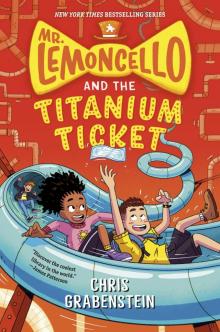 Mr. Lemoncello and the Titanium Ticket
Mr. Lemoncello and the Titanium Ticket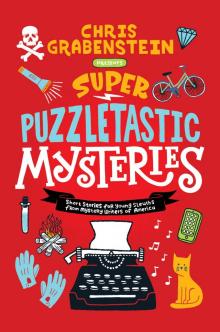 Super Puzzletastic Mysteries
Super Puzzletastic Mysteries Sandapalooza Shake-Up
Sandapalooza Shake-Up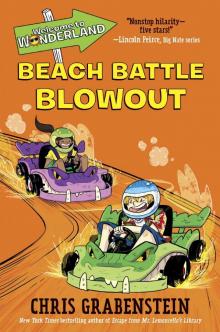 Welcome to Wonderland #4
Welcome to Wonderland #4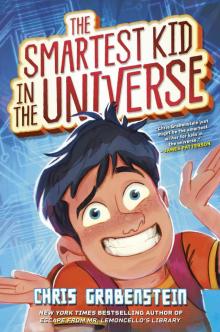 The Smartest Kid in the Universe
The Smartest Kid in the Universe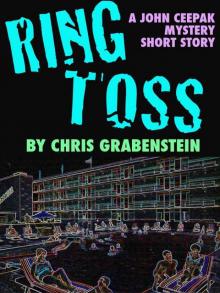 RING TOSS A John Ceepak Mystery Short (The John Ceepak Mysteries)
RING TOSS A John Ceepak Mystery Short (The John Ceepak Mysteries)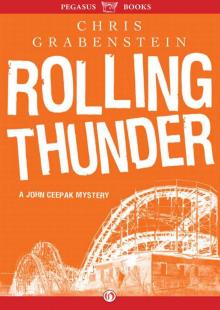 Rolling Thunder (John Ceepak Mystery)
Rolling Thunder (John Ceepak Mystery) Don't Call Me Christina Kringle
Don't Call Me Christina Kringle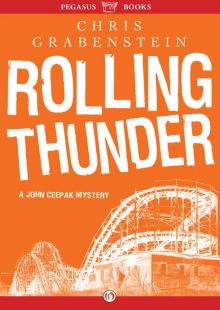 Rolling Thunder
Rolling Thunder The Crossroads
The Crossroads Hell Hole
Hell Hole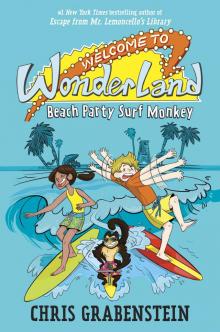 Beach Party Surf Monkey
Beach Party Surf Monkey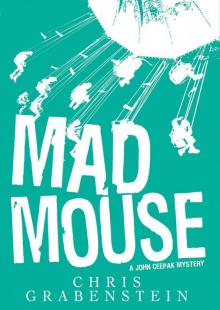 Mad Mouse: A John Ceepak Mystery (The John Ceepak Mysteries)
Mad Mouse: A John Ceepak Mystery (The John Ceepak Mysteries)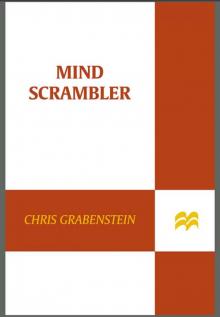 Mind Scrambler
Mind Scrambler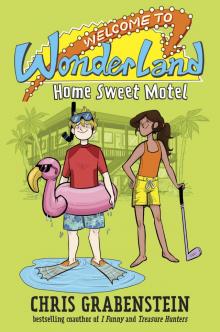 Home Sweet Motel
Home Sweet Motel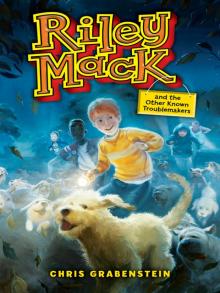 Riley Mack and the Other Known Troublemakers
Riley Mack and the Other Known Troublemakers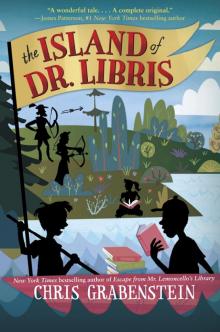 The Island of Dr. Libris
The Island of Dr. Libris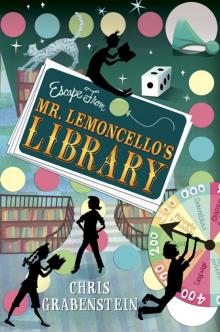 Escape From Mr. Lemoncello's Library
Escape From Mr. Lemoncello's Library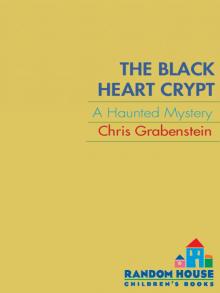 The Black Heart Crypt
The Black Heart Crypt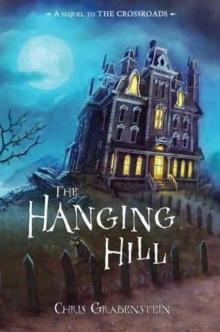 The Hanging Hill
The Hanging Hill Mr. Lemoncello's Great Library Race
Mr. Lemoncello's Great Library Race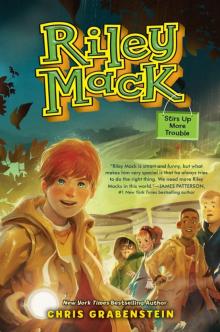 Riley Mack Stirs Up More Trouble
Riley Mack Stirs Up More Trouble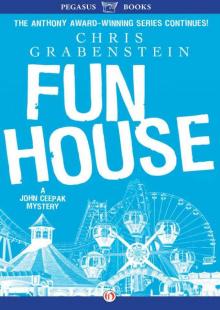 Fun House (John Ceepak Mystery)
Fun House (John Ceepak Mystery)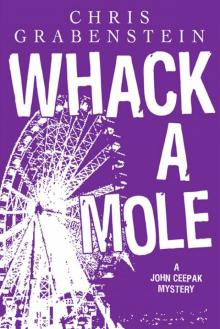 Whack A Mole: A John Ceepak Mystery (The John Ceepak Mysteries)
Whack A Mole: A John Ceepak Mystery (The John Ceepak Mysteries) Mr. Lemoncello's Library Olympics
Mr. Lemoncello's Library Olympics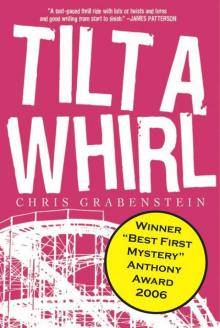 Tilt-a-Whirl jc-1
Tilt-a-Whirl jc-1 The Explorers’ Gate
The Explorers’ Gate The Smoky Corridor
The Smoky Corridor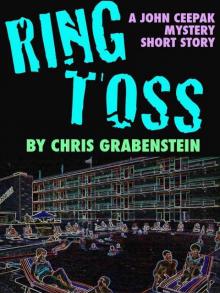 Ring Toss (john ceepak)
Ring Toss (john ceepak)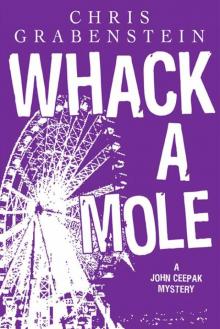 Whack A Mole jc-3
Whack A Mole jc-3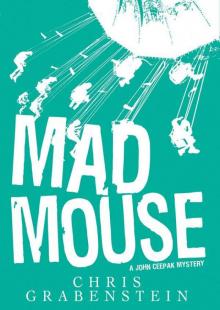 Mad Mouse js-2
Mad Mouse js-2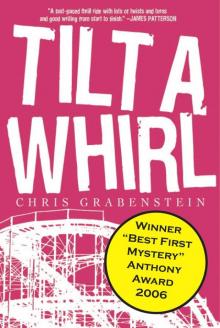 Tilt-a-Whirl (The John Ceepak Mysteries)
Tilt-a-Whirl (The John Ceepak Mysteries) Free Fall
Free Fall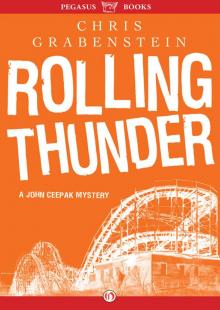 Rolling Thunder jc-6
Rolling Thunder jc-6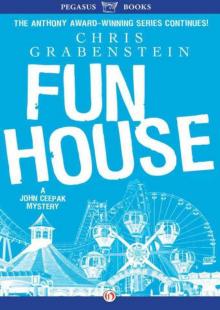 Fun House jc-7
Fun House jc-7